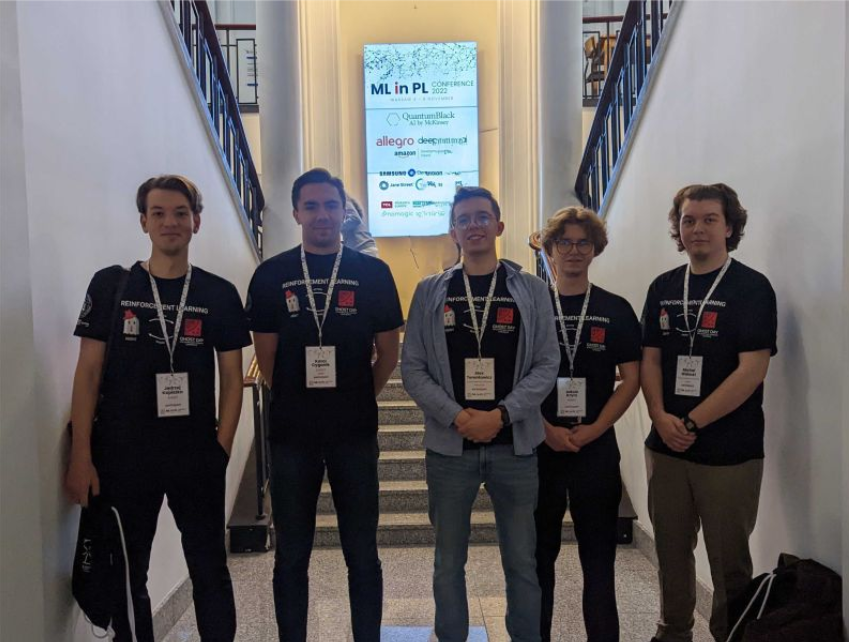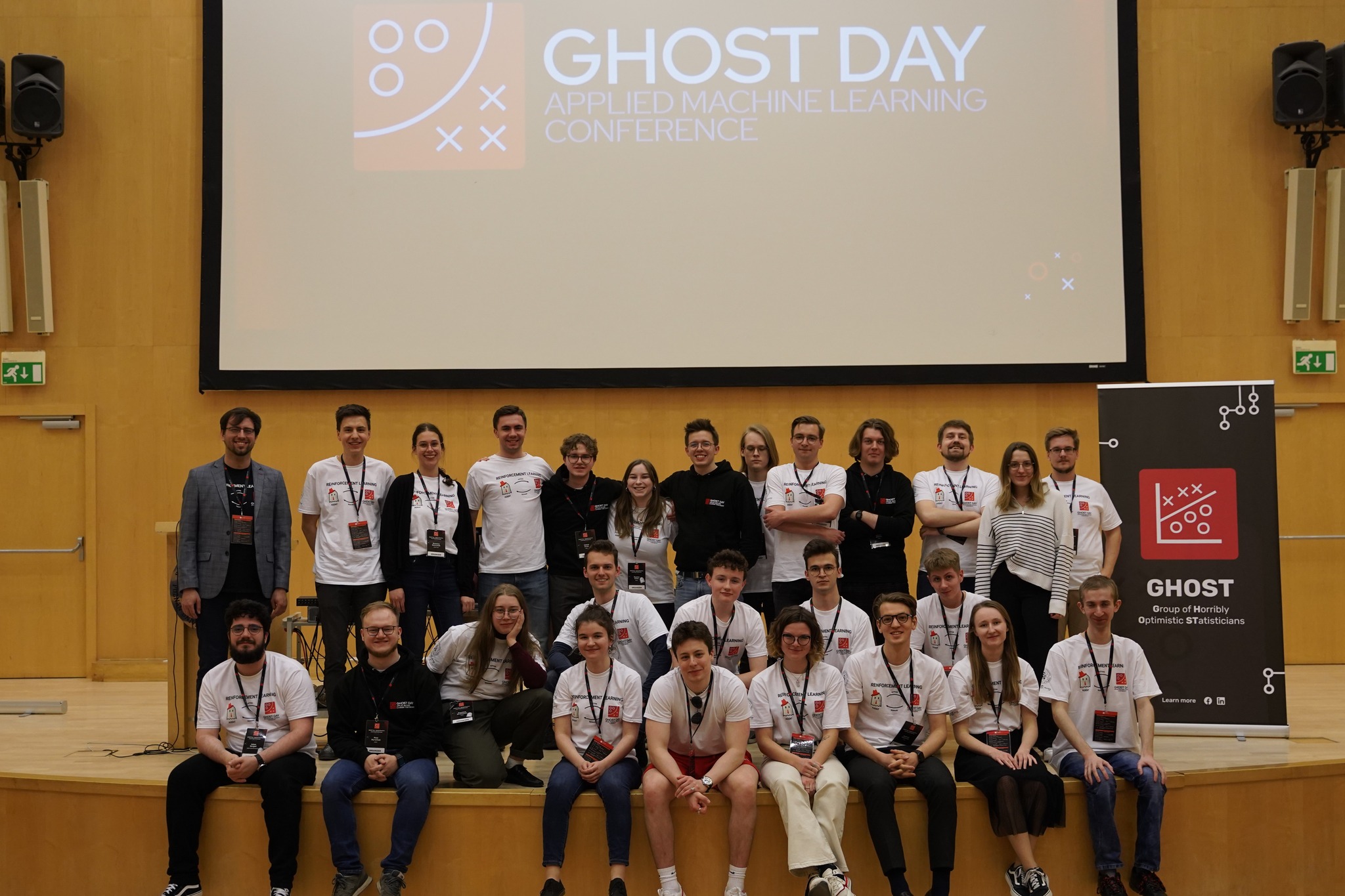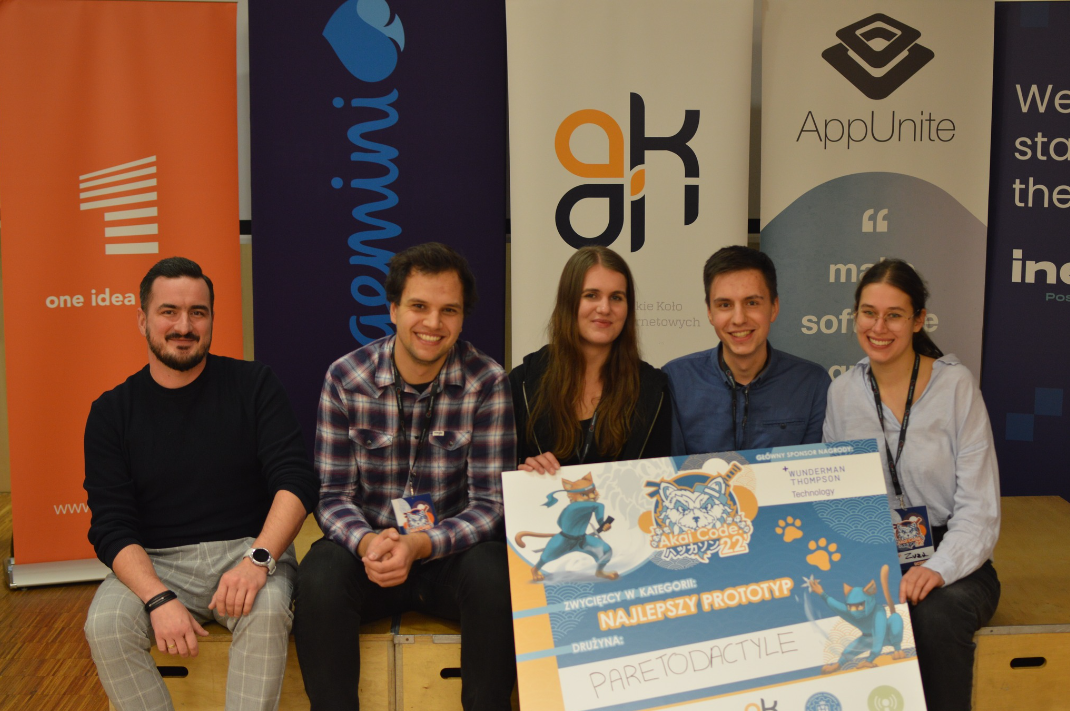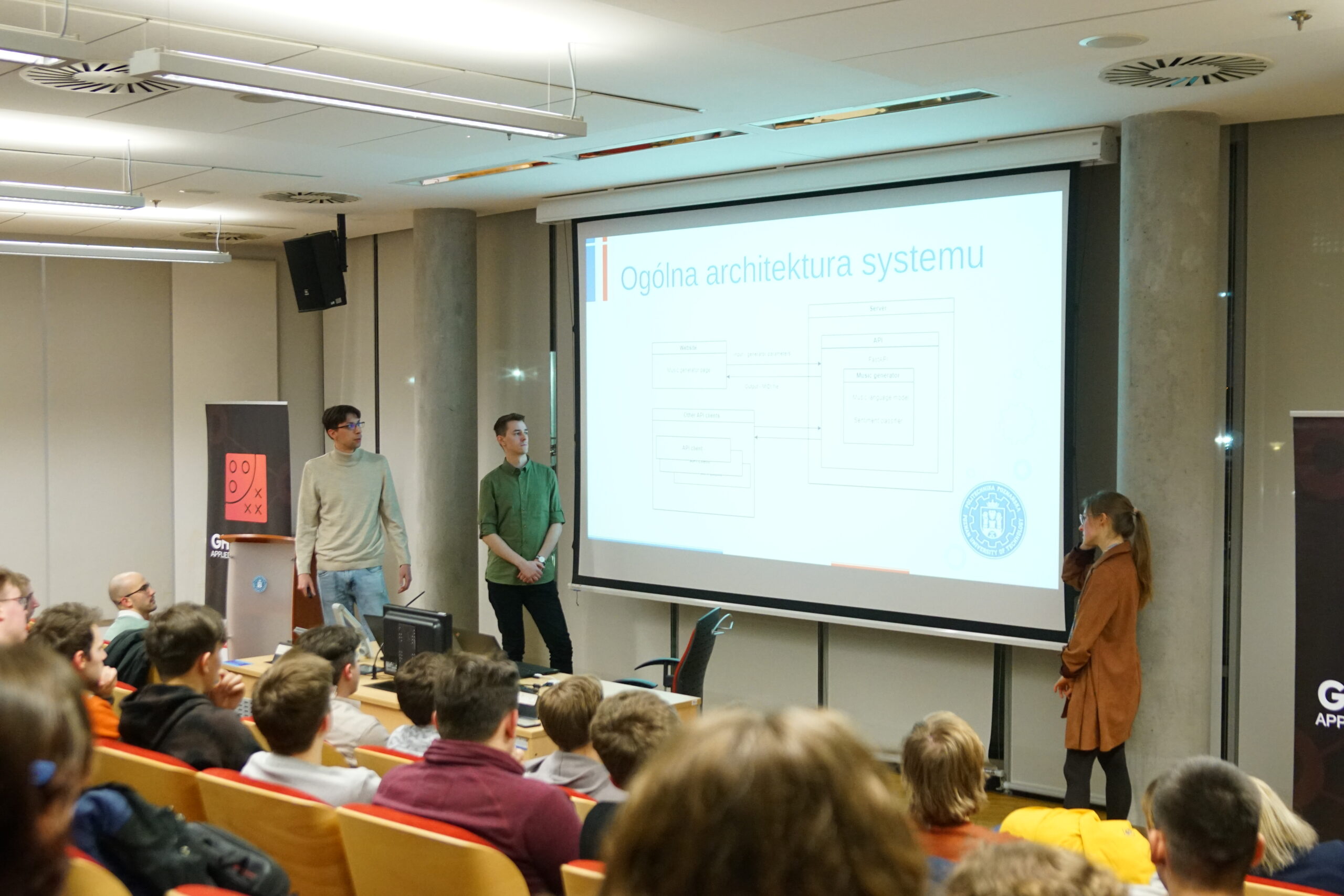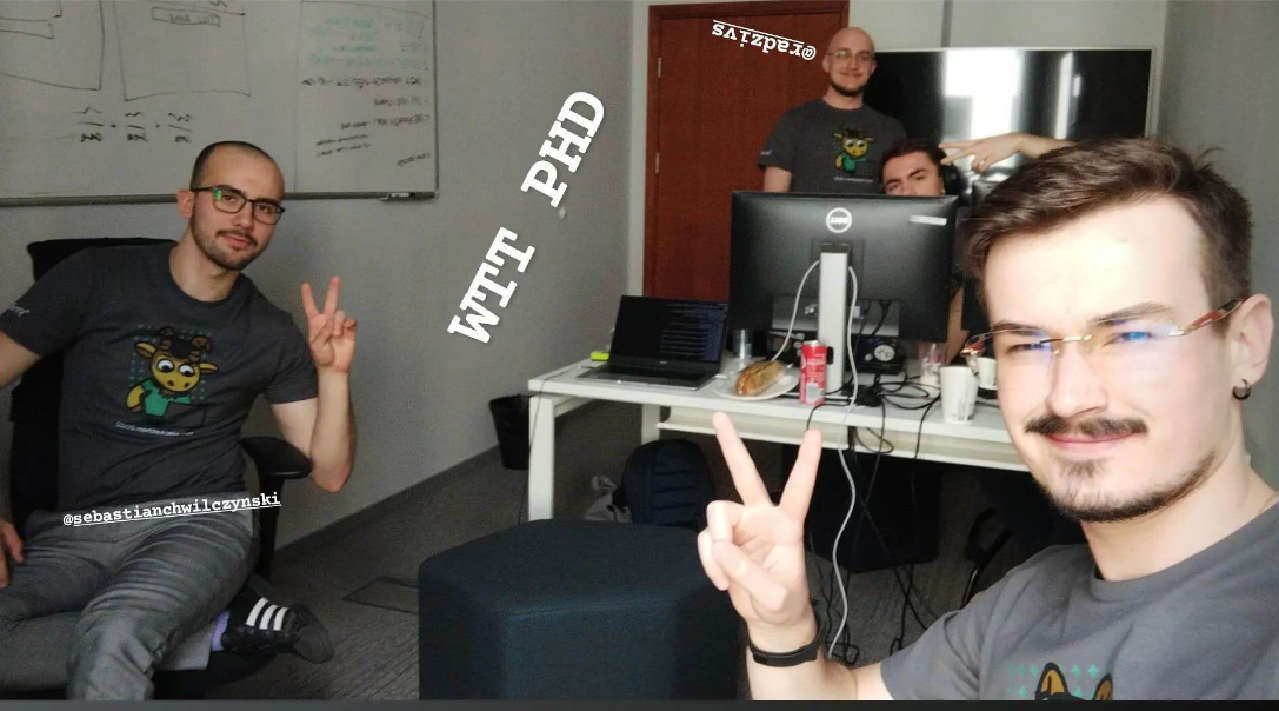The section will have a project-based character. The project will focus on creating a flood prediction system for regions prone to flooding. Then, we want to visualize the predicted flooding on images from the given region. We will use deep neural networks for this, so basic knowledge of them is welcome at the start. We invite people interested in geographic data, neural networks, and computer vision.
Group of Horribly Optimistic STatisticians
Welcome to GHOST! Our science club is a community of enthusiastic data scientists who are passionate about exploring the world through numbers and probabilities. Whether you are a seasoned data professional or just starting to explore the world of statistics, join us and become a part of the next generation of optimistic statisticians!
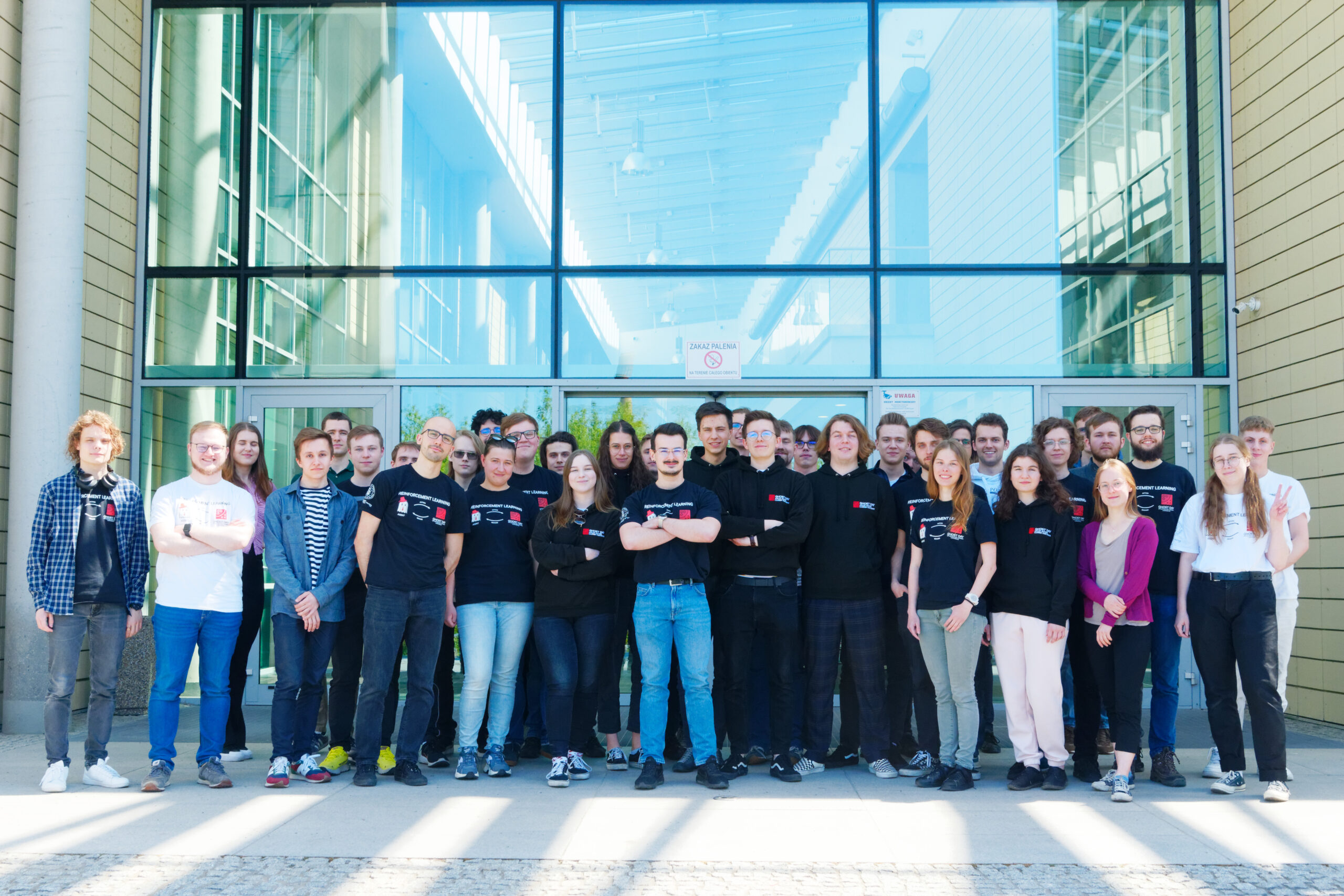
That's us
From the left: Łukasz, Piotrek, Agata, Antoni, Sebastian, Krzysztof, Adam, Konstanty, Asia, Przemek, Zuzanna, Oskar, Jacek, Alex, Michał, Ignacy, Anna, Łukasz, Tymon, Wojciech, Alicja, Zuzanna, Kacper (behind the camera) and many more that preferred coding instead of photo shoot.
We meet each week and do fun stuff with not only Machine Learning.
Our fellow members
Our sections
Sections are conducted in the Polish language. However, if there are people from abroad willing to join, we change to English. Schedule of meetings will be revealed soon.
GeoVision
Leaders: Maria Musiał, Agata Bielska.
GHOST Day: AMLC 2025 Committee
Leader: Rafał Malcewicz.
The organizing team of GHOST Day - one of the best ML-focused conferences in Poland - is looking for new members. We work in sub-teams such as: #finance_and_logistics: Managing the conference budget, organizing catering and afterparty, booking hotel rooms for invited guests, handling all necessary paperwork, etc. Everything needed to ensure GHOST Day can physically take place - our "where?" and "how?". #marketing: Managing our social media profiles, finding and contacting media partners, creating graphics, and maintaining our website. #speakers: Searching for potential speakers, inviting them, and maintaining further contact if they show interest. #sponsors: Collaborating with sponsors of our conference. By working on GHOST Day, you will have a unique opportunity to engage with top researchers and practitioners in the field of Artificial Intelligence. You will gain direct contact with professionals from renowned companies such as Google DeepMind, Meta AI, Mistral AI, OpenAI, Anthropic, Amazon, Microsoft, Intel, Nvidia, and more. This is also a chance to develop soft skills, explore the AI environment in Poland, and build your personal brand.
Intro to ML
Leaders: Paweł Siurek, Paweł Pomykała, Martyna Stasiak.
The "Intro to ML" section is starting again – this time in a refreshed and even more practical format! These sessions are for those who want to begin their journey with machine learning and artificial intelligence. We introduce fundamental concepts such as classification, clustering, and regression in a simple and accessible way, but we don't just focus on theory. We will demonstrate how ML works in practice using real-world examples and datasets, including those from everyday life. No prior experience is required – just curiosity and a willingness to learn! We rely, among other resources, on the free book "An Introduction to Statistical Learning" (statlearning.com). Our goal is to provide a smooth and enjoyable introduction to ML and solid preparation for more advanced topics. Everyone is welcome, and if you'd like to try your hand at giving a presentation, you can volunteer to discuss a selected topic!
Quantum Computing
Leaders: Dawid Siera, Mateusz Wyrzykowski.
Welcome to Quantum Computing for Machine Learning! Begin your journey where quantum computing technology meets the power of machine learning. This section is designed to guide you through the fascinating world of quantum technologies — from fundamental principles to advanced topics such as quantum-based machine learning models and algorithms. Whether you're a beginner looking to understand the basics or an advanced enthusiast eager to push the boundaries of quantum algorithms, you'll find something here for you. You’ll gain not only deep theoretical knowledge and practical skills but also the opportunity to interact directly with real quantum devices. Create a project with a new team, engage in exciting discussions, and become part of the quantum revolution!
LLM Crash Course
Leaders: Julia Mirońska, Igor Szymczak.
Intro to ML for Robotics
Leader: Viacheslav Krilyshyn
Have you ever wondered how autonomous robots, humanoids, or self-driving cars work? How do we connect advanced neural network algorithms with the real world? If so — we have a lot in common! In the Intro to ML for Robotics section, we’ll focus on the practical use of machine learning in robotics. Don’t worry if you don’t know something — everything is explained from the ground up! During the meetings, we’ll cover topics such as: Computer vision: how a robot can see and analyze its environment using cameras Hardware: edge computing as the robot’s heart Reinforcement Learning: the robot learns by trial and error Robot perception: how the robot gathers data from its surroundings ML in action: how to connect everything so it actually works! There will also be hands-on sessions using a real robot.
This section is aimed at people interested in the practical application of machine learning in robotics.
Classes will be conducted in English.
TinyML
Leader: Jan Łuczka.
TinyML is a section with a hands-on and practical focus, emphasizing practical applications, where we work on projects based on microcomputers and utilize machine learning solutions. In the upcoming semester, we will be working on a wheeled platform with a LiDAR sensor for 3D mapping on a Jetson Nano computer, as well as training and deploying audio recognition models on microcontrollers.
API — Artificial Practical Intelligence
Leaders: Maciej Mazur, Maciej Kaszkowiak, Jakub Binkowski, Jakub Grabowski, Benedykt Huszcza, Filip Kozłowski
Just getting started? Want to explore AI models from a practical perspective? In the Artificial Practical Intelligence section, you'll learn how to turn ready-made resources into working applications! Our meetings will be divided into two parts: - Lectures on cool topics – 32 mg of theory and 100 ml of practice, meaning useful knowledge in a condensed form. - Mini-projects – apply your newly acquired knowledge by developing your own ideas! We want to co-create this section with you, so join us and see if this is the right place for you.
Intro to Data Science
Leaders: Maksymilian Norkiewicz, Jędrzej Ogrodowski.
At the Intro to DS meetings, we introduce the basics of data science – from data collection, through processing and visualization, to interpreting results. The meetings are lecture-based, with one person presenting a specific topic. Members of the group can also give talks on chosen subjects. At the end of the series, we organize an analytical competition involving the preparation of an analysis of a selected dataset, which is then evaluated by the other participants.
Management team
We are looking for people interested in: helping manage our social media (Facebook, LinkedIn) and website, participating in the organization of various events, workshops, and meetups, creating promotional graphics and handling the club’s marketing.
Found your favourite section already?
Contact
We also invite people who would like to present some data analysis topics/projects at one of our meetings. We are open to suggestions!
Email :
Address :
Institute of Computing Science, ul. Piotrowo 2, 60-965 Poznan, Poland


